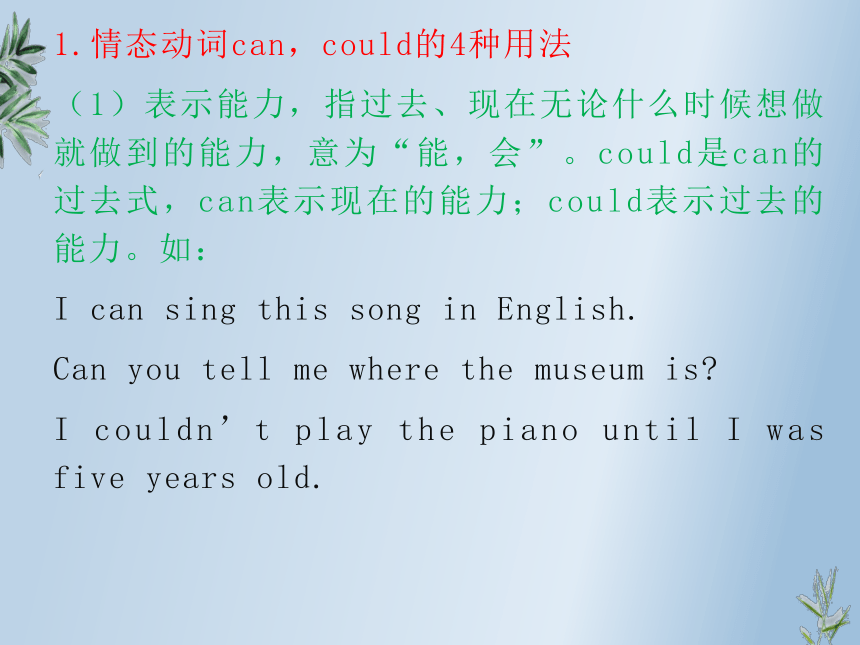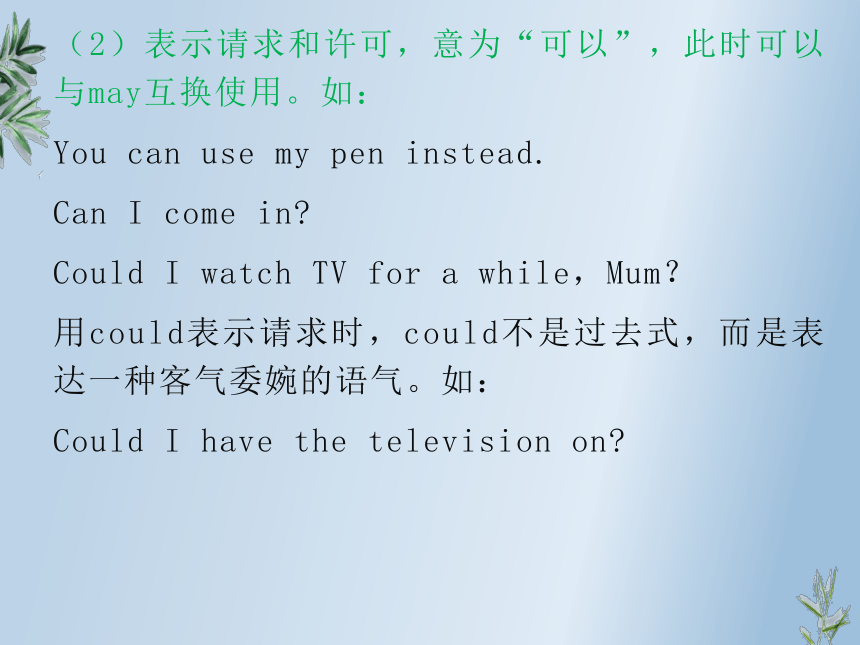初中全新英语语法——情态动词(共19张PPT)
文档属性
| 名称 | 初中全新英语语法——情态动词(共19张PPT) |  | |
| 格式 | ppt | ||
| 文件大小 | 2.1MB | ||
| 资源类型 | 教案 | ||
| 版本资源 | 通用版 | ||
| 科目 | 英语 | ||
| 更新时间 | 2022-04-10 18:31:07 | ||
图片预览







文档简介
(共19张PPT)
初中全新英语语法
情态动词
情态动词是表示说话人的语气或情态的动词。情态动词本身有词义,但不能单独作谓语,在句中必须跟动词原形,并与后面的动词原形一起构成谓语。情态动词没有人称和数的变化。常用的情态动词有:can,may,must,could,might,will,shall,would,should,need等。
1.情态动词can,could的4种用法
(1)表示能力,指过去、现在无论什么时候想做就做到的能力,意为“能,会”。could是can的过去式,can表示现在的能力;could表示过去的能力。如:
I can sing this song in English.
Can you tell me where the museum is
I couldn’t play the piano until I was five years old.
(2)表示请求和许可,意为“可以”,此时可以与may互换使用。如:
You can use my pen instead.
Can I come in
Could I watch TV for a while,Mum?
用could表示请求时,could不是过去式,而是表达一种客气委婉的语气。如:
Could I have the television on
(3)表示肯定推测,意为“可能,会”,但只表示一种猜测或者是理论上的可能性;表示否定推测,can't意为“不可能;不会”。如:
Can he be there too
Even experienced teachers can make mistakes.
He can’t have finished his work.
(4)表示惊讶,通常用于疑问句、否定句和感叹句中。如:
Can this be your reason
How can you say it like that
2.情态动词may,might的用法
(1)表示请求和许可,意为“可以”,比can和could正式。might含有试探和犹豫不决的意思。表示给予许可时,用may不用might;may not用来表示拒绝或禁止。如:
May /Might/Can I come in
He said I might borrow his car
You may take everything you like.
You may not go out at night.
(2)表示推测,通常用于肯定句和否定句中,意为“可能”。如:
He may be very busy now.
Peter might phone. If he does,could you ask him to ring later
He said that she might not be at work today.
3.情态动词must与have to
(1)must表示主观义务,意为“必须”,其否定句must not可缩写为mustn't,意为“不能,不准”。如:
We must get there before five o’clock.
You mustn’t break the rules.
(2)must表示推测、推断,只用于肯定句中,意为“一定,必定”。如:
He must be our headmaster.
They are friends. He must know about him.
He must have seen the film last night.
(3)have to表示客观要求,意为“不得不;必须;得”。如:
Now there’s no bus here,so we have to walk home.
We have no food at home,you have to go and get some,Tom.
(4)have to可以用于多种时态;而must只用于一般现在的时态。如:
I had to get up early yesterday.
You will have to be here on time next Monday.
4.情态动词need的用法
(1)need作情态动词,其后用动词原形,只用于否定句和疑问句中。在疑问句中need意为“需要”;在否定句中,need与not可缩写为needn't,意为“不必”。如:
You needn’t go there yourself.
Need I help you do the housework
(2)need还可用作实义动词,意为“需要”,这时need有人称、数及时态的变化,它可接名词,代词,动词不定式及动词的-ing形式作宾语。接动词-ing形式作宾语时,它的主语形式表被动意义。如:
He need help.
Does he need help
He doesn’t need cleaning.
The house needs cleaning.
The house needs to be cleaned.
5.情态动词will与would的用法
(1)will和would作情态动词表示意愿。will表示现在的意愿,would表示过去的意愿。
如:I will pay you at the rate you ask.
Go where you will.
He wouldn’t help me yesterday.
She asked if I would go with him.
(2)表示征求意见或提出请求,主要用于第二人称的疑问句中,will和would均可用,would此时并不表过去,而表示委婉语气。如:
Won’t you take off your coat
Will/Would you please post the letter for me
Would Sunday night suit you
(3)表示习惯和倾向性。will表示现在的习惯,would表示过去的习惯。如:
Oil will float on water.
This window won’t open.
When he was a child,he would often go skiing.
(4)表示推测。will用于谈论现在,would可用于谈论过去,也可用于谈论现在,但语气较will
更委婉。如:
This car will hold six people.
Ask him.He will know.
You wouldn't know.
Every family would have some sort of trouble.
The person you mentioned would be her father, is that right
6. 情态动词shall的用法
(1) shall在疑问句中用来征求对方意见,主要用于第一人称,在英国英语中也用于第三人称,意为“要不要;......好吗”。如:
Shall we meet again tonight
Shall they wait for you
(2) shall在陈述句中表示说话者的允诺、告诫、威胁、命令、必然性等,主要用于第二、第三人称。如:
You shall suffer for this.(表示威胁)
That day shall come.(表示必然性)
You shall hear everything directly you come.(表示允诺)
7.情态动词should的用法
(1)表示义务、责任等,意为“应该,应当”。否定句should not可缩写为shouldn't。如:
He should work harder.
You should help your mother with the housework.
You shouldn't leave your little brother at home by himself.
(2)表示可能性,意为“可能;该;按道理来说”。如:
He should arrive soon.
The train should have already left.
初中全新英语语法
情态动词
情态动词是表示说话人的语气或情态的动词。情态动词本身有词义,但不能单独作谓语,在句中必须跟动词原形,并与后面的动词原形一起构成谓语。情态动词没有人称和数的变化。常用的情态动词有:can,may,must,could,might,will,shall,would,should,need等。
1.情态动词can,could的4种用法
(1)表示能力,指过去、现在无论什么时候想做就做到的能力,意为“能,会”。could是can的过去式,can表示现在的能力;could表示过去的能力。如:
I can sing this song in English.
Can you tell me where the museum is
I couldn’t play the piano until I was five years old.
(2)表示请求和许可,意为“可以”,此时可以与may互换使用。如:
You can use my pen instead.
Can I come in
Could I watch TV for a while,Mum?
用could表示请求时,could不是过去式,而是表达一种客气委婉的语气。如:
Could I have the television on
(3)表示肯定推测,意为“可能,会”,但只表示一种猜测或者是理论上的可能性;表示否定推测,can't意为“不可能;不会”。如:
Can he be there too
Even experienced teachers can make mistakes.
He can’t have finished his work.
(4)表示惊讶,通常用于疑问句、否定句和感叹句中。如:
Can this be your reason
How can you say it like that
2.情态动词may,might的用法
(1)表示请求和许可,意为“可以”,比can和could正式。might含有试探和犹豫不决的意思。表示给予许可时,用may不用might;may not用来表示拒绝或禁止。如:
May /Might/Can I come in
He said I might borrow his car
You may take everything you like.
You may not go out at night.
(2)表示推测,通常用于肯定句和否定句中,意为“可能”。如:
He may be very busy now.
Peter might phone. If he does,could you ask him to ring later
He said that she might not be at work today.
3.情态动词must与have to
(1)must表示主观义务,意为“必须”,其否定句must not可缩写为mustn't,意为“不能,不准”。如:
We must get there before five o’clock.
You mustn’t break the rules.
(2)must表示推测、推断,只用于肯定句中,意为“一定,必定”。如:
He must be our headmaster.
They are friends. He must know about him.
He must have seen the film last night.
(3)have to表示客观要求,意为“不得不;必须;得”。如:
Now there’s no bus here,so we have to walk home.
We have no food at home,you have to go and get some,Tom.
(4)have to可以用于多种时态;而must只用于一般现在的时态。如:
I had to get up early yesterday.
You will have to be here on time next Monday.
4.情态动词need的用法
(1)need作情态动词,其后用动词原形,只用于否定句和疑问句中。在疑问句中need意为“需要”;在否定句中,need与not可缩写为needn't,意为“不必”。如:
You needn’t go there yourself.
Need I help you do the housework
(2)need还可用作实义动词,意为“需要”,这时need有人称、数及时态的变化,它可接名词,代词,动词不定式及动词的-ing形式作宾语。接动词-ing形式作宾语时,它的主语形式表被动意义。如:
He need help.
Does he need help
He doesn’t need cleaning.
The house needs cleaning.
The house needs to be cleaned.
5.情态动词will与would的用法
(1)will和would作情态动词表示意愿。will表示现在的意愿,would表示过去的意愿。
如:I will pay you at the rate you ask.
Go where you will.
He wouldn’t help me yesterday.
She asked if I would go with him.
(2)表示征求意见或提出请求,主要用于第二人称的疑问句中,will和would均可用,would此时并不表过去,而表示委婉语气。如:
Won’t you take off your coat
Will/Would you please post the letter for me
Would Sunday night suit you
(3)表示习惯和倾向性。will表示现在的习惯,would表示过去的习惯。如:
Oil will float on water.
This window won’t open.
When he was a child,he would often go skiing.
(4)表示推测。will用于谈论现在,would可用于谈论过去,也可用于谈论现在,但语气较will
更委婉。如:
This car will hold six people.
Ask him.He will know.
You wouldn't know.
Every family would have some sort of trouble.
The person you mentioned would be her father, is that right
6. 情态动词shall的用法
(1) shall在疑问句中用来征求对方意见,主要用于第一人称,在英国英语中也用于第三人称,意为“要不要;......好吗”。如:
Shall we meet again tonight
Shall they wait for you
(2) shall在陈述句中表示说话者的允诺、告诫、威胁、命令、必然性等,主要用于第二、第三人称。如:
You shall suffer for this.(表示威胁)
That day shall come.(表示必然性)
You shall hear everything directly you come.(表示允诺)
7.情态动词should的用法
(1)表示义务、责任等,意为“应该,应当”。否定句should not可缩写为shouldn't。如:
He should work harder.
You should help your mother with the housework.
You shouldn't leave your little brother at home by himself.
(2)表示可能性,意为“可能;该;按道理来说”。如:
He should arrive soon.
The train should have already left.
同课章节目录
- 词法
- 名词
- 动词和动词短语
- 动词语态
- 动词时态
- 助动词和情态动词
- 非谓语动词
- 冠词
- 代词
- 数词和量词
- 形容词副词及其比较等级
- 介词和介词短语
- 连词和感叹词
- 构词法
- 相似、相近词比较
- 句法
- 陈述句
- 一般疑问句和否定疑问句
- 特殊疑问句及选择疑问句
- 反意疑问句
- 存在句(There be句型)
- 宾语从句
- 定语从句
- 状语从句
- 主谓一致问题
- 简单句
- 并列句
- 复合句
- 主谓一致
- 主、表语从句
- 名词性从句
- 直接引语和间接引语
- 虚拟语气
- 感叹句
- 强调句
- 倒装句
- 祈使句
- 句子的成分
- 句子的分类
- 题型专区
- 单项选择部分
- 易错题
- 完形填空
- 阅读理解
- 词汇练习
- 听说训练
- 句型转换
- 补全对话
- 短文改错
- 翻译
- 书面表达
- 任务型阅读
- 语法填空
- 其他资料
